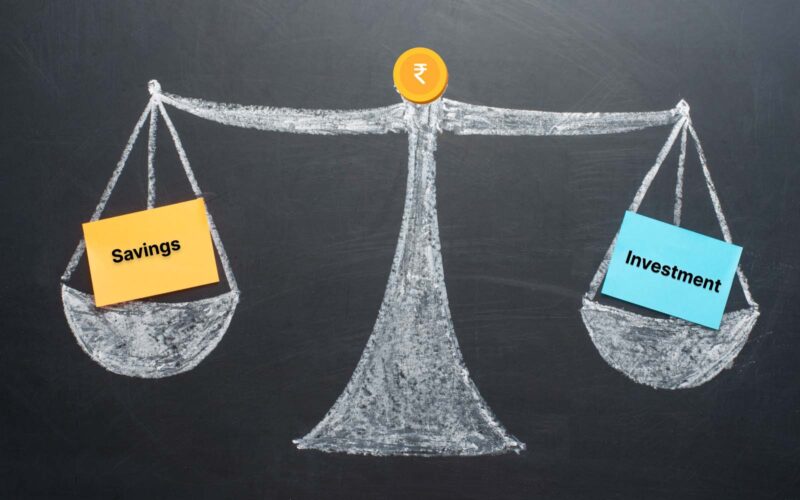The terms ‘savings’ and ‘investment’ are often used interchangeably. However, it is important to note that they are quite different from each other. Beginning early is a fantastic approach to positioning oneself for long-term financial stability. Both investing and saving money are crucial elements of personal financial growth. This article focuses on understanding both these terms with examples, the difference between savings and investment, along with focusing on which one is better for generating wealth.
What is Saving?
People set aside cash for both spending and emergency expenses. Saving, which involves putting money aside for use in the future, is a crucial aspect of personal finance. Just like children deposit their pocket money in a piggy bank, adults too can save their money by using a savings account or a certificate of deposit (CD) that has the added benefit of accruing interest and letting your savings grow. You can save money for a variety of things, such as for buying a new phone, sudden repairs, buying required household objects or creating a small emergency fund for unforeseen expenses.
Saving is a great method to achieve short-term financial objectives and be ready for unforeseen events. Regular savings can help you create a financial buffer that will enable you to survive difficult times. Savings are typically low-risk investments, so your money is secure, but the interest you earn is also minimal.
One way to save is to put a percentage of your salary or allowance into a savings account each month. For example, you have a year to save Rs. 2,400 for a new laptop. You may achieve your goal without paying interest on a loan or credit card if you save Rs. 200 each month. Automatic transfer is another way to ensure that you constantly save money manually.
What is Investing?
By putting your money to work in investment vehicles like stocks, bonds, and mutual funds, investing is a method to see your money grow over time. Unlike saving money, investing entails some risk (mostly if invested for the short term) but can generate larger profits over time. Investing is a good option to achieve long-term financial objectives, such as saving for retirement, a down payment for a new house, an international vacation or college fees for higher studies abroad.
Investing carries some risk, which is why choosing to invest in vehicles that align with your financial goals, the level of risk you can bear, and the time for investment is critical. Since you have more time to ride out the ups and downs of the stock market, you can generally take on more risk the longer you invest.
It is crucial to diversify your portfolio by making investments in several areas instead of one. This will help you lower your risk. For example, let us consider that you wish to invest in Flipkart. You can own a small portion of the business and take advantage of its expansion and earnings by purchasing shares of its stock. If Flipkart does well, the stock’s value may rise over time, enabling you to sell it for a profit. You should always be aware that investing carries a risk of financial loss because there are no guarantees. If Flipkart were to file for bankruptcy, the investments you made would not yield fruitful earnings. So, it is always best to make investments in several vehicles like stocks, mutual funds, and more.
Saving vs Investing: Which is Better?
There are several saving vs investing quotes that leave us perplexed. Even questions like “Is investing better than saving?” “Which is more important?” “Should I start saving first, or should I invest my money instead?” can often be confusing, but the answer is quite plain. Your present financial situation and your goals of financial growth ultimately determine which of the two is the best choice.
While both are essential, they serve different requirements. You should start saving because everyone needs money for sudden urgent requirements. However, it is better to start investing if you need money for long-term objectives. Striking a balance between the two can aid in the achievement of your short and long-term financial objectives.
When to Save Money?
- Emergency funds are the most important reason to save. If you don’t have a fund, focus on creating one first before looking to invest. Most experts advise putting away three to six months’ worth of emergency expenditure, if not more, in a fund.
- A savings account with a high rate of return or a money-market fund is the best option for you if you need the money within the next few years.
- Prior to making investments, it is essential to work towards paying off high-interest debt, such as credit card bills.
When to Invest Money?
- Investing the additional cash can help you steadily build up your wealth if you have a sizable emergency fund and no high-interest debt. Investing is crucial if you want to achieve long-term goals, including retirement.
- If you don’t need the money for at least five years (or longer) and are comfortable taking some risk, investing the funds will likely yield higher returns than saving.
- Whether or not you qualify for an employer match in your retirement plan, such as a 401(k). It is crucial to make a sufficient contribution to ensure you receive the match because it is effectively free money.
How to Save Effectively?
We all know how difficult it is to save money, given our endless wants. Setting aside money each month can seem tough because of growing inflation and mounting bills. However, even if you have to start out by saving less, it is crucial that you develop the habit of saving money. This is so that periodic small sums of money might accumulate over time to become significant money.
How to Invest Efficiently?
Study the numerous investing alternatives and choose the ones that best meet your needs. When you do discover the ideal investment tools, keep in mind to begin small and expand with them over time. Remember that different investments have different risks and returns. As a result, instead of putting all your eggs in one basket, it is critical to diversify your investments in line with your level of risk tolerance, time horizon for making investments, and available cash.
Another thing to bear in mind is that investments can have a volatile pattern, particularly over short time periods. Because of this, it’s crucial to hold onto your investments for at least three to five years before considering selling them. To avoid having to withdraw your cash early in the event of a financial emergency, you should only invest money that you won’t need immediately.
Conclusion:
What is the difference between saving and investing – there are a lot of people who run into this problem of choice. So don’t worry if you’re thinking along similar lines; you’re not alone. Just keep in mind that both are necessary for your financial security. Therefore, it is wise for you to start working on both of these right away, if you have not already, in accordance with your own personal goals.










